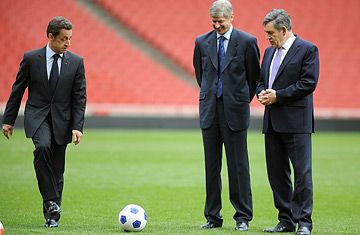
French President Nicolas Sarkozy, poses with Britain's Prime Minster Gordon Brown and Arsenal manager Arsene Wenger at the Emirates Stadium in London
It was the first state visit by a French president to Britain in more than a decade. But the visitor seemed to feel quite at home in a summit between British and French leaders in London Thursday. The huddle took place at a soccer stadium belonging to Arsenal, a high-flying London club that owes much of its success to a coach and half dozen players who are French. When France's President Nicolas Sarkozy took to the turf for photos with British Prime Minister Gordon Brown, it was Sarkozy who looked keenest for a kick about, back-heeling a ball toward a much more bashful Brown. And while on paper, neither leader had to concede any precious ground in a summit declaration pledging closer ties between Britain and France, in spirit, Sarkozy's signature stood out the boldest.
In a speech to both Houses of Parliament a day earlier, a pumped-up Sarkozy appealed for an entente amicale — or friendly understanding — between the two countries, coaxing a standing ovation out of British lawmakers old enough to remember decades of bitter wrangling with the U.K.'s close neighbor, often over aspects of the European Union, most recently over the invasion of Iraq. Now was the time, declared Sarkozy on the opening day of his two-day state visit to Britain, for a "Franco-British brotherhood."
Thursday's summit declaration fleshed that out: both countries pledged to double up efforts in a raft of areas, from the push for greater transparency in the money markets to the fight against global warming. Both would do more to inflate Europe's military muscle, pump more cash into joint defense R&D projects and bolster their own border controls. And to better face down global challenges, officials from both countries would meet quarterly to discuss hot-button topics; senior ministers meeting every six months would do the same.
To both leaders, the pledges marked a "historic" summit; and stacked against the 2003 squabbles over the Iraq war, no one would begrudge some brotherly love. But amid the love-in, Sarkozy "didn't propose anything you can put into policy or take to the bank," notes Gilles Delafon, an author and French political commentator. So while his powerful speech to Parliament "made people take notice, listen attentively, and feel positive and hopeful," Delafon says, "that's what he does. Look for the beef, and you won't find any." Sure enough, there was no firm talk of testy topics like the E.U.'s common agricultural policy, one that France defends only as keenly as Britain wishes to see it scrapped.
Omissions like that poke holes in Sarkozy's calls in London for Britain and France to sit together at the heart of Europe. So too his cosying up to the U.K. at a time when France's standing with Germany — traditionally, France's closest ally in E.U. horse trading — is down. Sure, Brown and Sarkozy are getting along just fine; time spent working together as national finance ministers at the European level has done them no harm. And Sarkozy's plans for a Mediterranean union and criticisms of the Frankfurt-based European Central Bank have irked German Chancellor Angela Merkel. But "to do anything major in Europe, France needs the support and solidarity of Germany — at times, in the face of British resistance," says Delafon. "It's fantasy to believe that the U.K. would somehow take the place or join Germany as France's principal partner in Europe."
So look home to la belle France for Sarkozy's dividends from this trip. Since his election last May as a populist, straight-talking President, his appeal has waned. Flash watches and swish sunglasses landed him the nickname "President Bling Bling." Sarkozy's very public romance with Carla Bruni, the former supermodel who he married last month, did little for the reputation of his office. Moreover, much ballyhooed reforms aimed at revving up France's spluttering economy have so far been disappointing, leaving his center-right UMP party humiliated by voters in local elections earlier this month.
A well-meaning trip to the U.K., though, could give his popularity a boost. While Sarkozy's approval rating has tumbled to 38% from 64% last fall, "we'll probably see Sarkozy's number jump anywhere from 5% to 10% thanks to the coverage of this visit to London — even though it won't actually produce anything concrete," says Delafon. That will only get Sarkozy so far, though. Amid the castle walls, fudge shops and quaint tearooms of Windsor, the fairytale town just outside London where Sarkozy was hosted by Britain's Queen, one visiting French schoolgirl recognized a "great president" in Sarkozy, let down only by "promises he's not kept." When he returns to France, things for Sarkozy will no doubt be tougher. With reporting by Bruce Crumley/Paris
